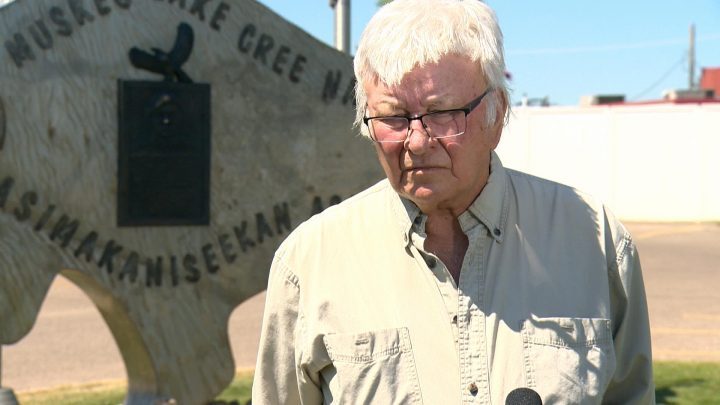Roland Crowe still remembers his first day at Marieval Indian Residential School.

He was about seven years old when he first attended the day school in the 1950s.
“I got a strapping from the Sister for things that I wasn’t supposed to do or say,” Crowe said.
“The nuns and the priest were absolutely brutal.”
From that day on, most of Crowe’s school experiences over the next seven years weren’t very happy ones.
Crowe says teachers would speak French to one another, often times referring to the students as savages.
Other times, students were hit from the back with rulers or an open hand, according to Crowe.
“A lot of us who went to residential school have busted eardrums today,” he said.
Crowe says he still lives with the trauma today. But it’s not just residential school students seeing the effects. He says many Indigenous people face a lot of the same issues and many of them stem from economic inequality.
“This country has go give us a fair opportunity for employment, economic opportunities and jobs,” he said.
“Until that’s done, there’s always going to be problems.”
Meadow Musqua, 17, is the first generation in her family to not attend a residential school, but she knows of the harm it caused.
The Dakota, Saulteaux and Cree teenager says her dad doesn’t talk about his time at residential school, but he does struggle with alcohol abuse as a result of attending.
“He’s a really hard man. He doesn’t like showing his feelings,” she said.
Growing up, Musqua says her dad taught her about Indigenous culture and right from wrong, but wasn’t there for her emotionally.
“When it came to being there and understanding me and my feelings it was kind of shut off,” she said.
She says her dad didn’t have a connection with his parents either — a direct result of the trauma they faced at residential schools. That intergenerational trauma is now trickling down to Musqua’s relationships.
She finds caring for people difficult, because she says her father never expressed his love when she was younger.
“It’s a new thing for me — having to show love when I wasn’t really shown it myself,” Musqua said.
“But I love showing my nieces and nephews that I love them.”
In light of the unmarked graves found on Cowessess First Nation, Musqua says Indigenous and non-Indigenous people need to build a connection, ask questions and learn about the impacts of residential schools.
“I wish that people would stop telling us to get over it because that’s not something you can get over,” she said.
Sarah Wolfe, a member of Piapot First Nation, says her family never talked about residential schools despite her grandparents, uncles and aunts all attending.
The 16-year-old says she didn’t really learn about them until a brief lesson in class at her Catholic school in Regina.
Once she knew the history and horrors of residential schools, she says she questioned her identity as a member of the Catholic Church.
“I do feel like it’s a betrayal to my own people,” Wolfe said.

Growing up, Wolfe says her family was very religious and didn’t practice Indigenous traditions — a result of many generations being stripped of their culture at residential schools.
However, Wolfe says she now balances out her identity by embracing Indigenous culture, taking part in smudges and ceremonies, and spending time on her First Nation.
“It’s something I’m not scared to do anymore,” Wolfe said.
“Before it was all new and it was more of a journey of finding that part of myself.”
Now that Wolfe is more comfortable with her identity, she says she feels an obligation to learn, educate and speak out on Indigenous issues, including the effects of intergenerational trauma brought on by residential schools.
“We’re speaking for the people who back then didn’t have a voice,” she said.
“Now that things are being brought to light and the younger generation is stepping up, it gives us a chance to really show what these people went through as well as how it affects all of us.”
The Indian Residential Schools Resolution Health Support Program has a hotline to help residential school survivors and their relatives suffering with trauma invoked by the recall of past abuse. The number is 1-866-925-4419.







Comments